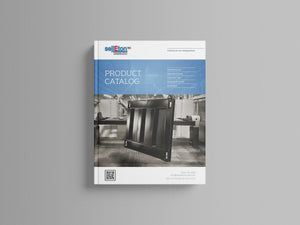
Precision and Accuracy: Choosing the Best Digital Weighing Scales
Digital weighing scales are essential for precise weight measurements in warehouses and industrial settings. They enhance accuracy, reduce errors, and save time. This article explores the benefits, uses, and types of digital weighing scales to help you pick the right one.
Key Takeaways
-
Digital weighing scales are essential for warehouse operations, enhancing accuracy and reducing human error in inventory management.
-
Different types of scales, such as floor, bench, and portable scales, cater to specific warehouse needs, ensuring efficiency for a variety of weighing tasks.
-
Technological advancements, including wireless connectivity and advanced software features, significantly improve operational efficiency and data integration in warehouse management systems.
The Role of Digital Weighing Scales in Warehouse Operations
Digital weighing scales are the unsung heroes of warehouse operations, playing a pivotal role in streamlining inventory processes. These scales provide precise weight measurements, which are essential for maintaining data accuracy and reducing human error. Correct weighing of every item with digital scales significantly improves inventory data reliability, simplifying stock tracking and management. In large distribution centers, even minor discrepancies can lead to significant financial losses, making this accuracy particularly crucial.
Moreover, digital scales are incredibly versatile, capable of handling a wide range of weights. This versatility makes them suitable for various applications within a warehouse, from weighing small packages to large pallets.
Whether it’s a floor scale for heavy loads or a bench scale for smaller items, digital weighing solutions cater to the diverse needs of modern warehouses. This adaptability not only enhances operational efficiency but also ensures that the right tools are available for different weighing tasks, thereby optimizing the workflow.
Types of Digital Weighing Scales for Warehouses
In the realm of warehouse operations, one size does not fit all. Different tasks require different tools, and digital weighing scales are no exception. There are various types of digital scales designed to meet specific needs, each with its unique features and benefits. These include floor scales, bench scales, and portable scales, among others. Understanding the distinct advantages of each type can help you choose the best solution for your warehouse requirements.
Floor scales are ideal for weighing large and heavy items, making them indispensable in industrial environments. Bench scales, on the other hand, are perfect for smaller items and tasks that require precision in limited spaces. Industrial scales are also essential for various applications in these settings.
Portable scales offer the flexibility to conduct weighing tasks in various locations within the warehouse. Each type of scale enhances operational speed by providing instant weight readings, thus reducing waiting times during logistics processes. Let’s delve deeper into the specifics of these scales.
Floor Scales
Floor scales are the workhorses of industrial weighing solutions. Designed to handle large and heavy items, these scales are essential for environments where substantial weights are a common occurrence. The robust construction of floor scales ensures they can withstand the rigors of daily use, providing reliable measurements for significant loads. This makes them particularly useful in warehouses where efficiency and accuracy are paramount.
The ability of floor scales to weigh large items efficiently is a major advantage in warehouse operations. They are built to handle heavy loads, ensuring that even the most substantial items are weighed accurately and quickly. This reliability is crucial for maintaining the integrity of inventory data, preventing costly errors, and optimizing the overall workflow.
Whether it’s weighing pallets, drums, or other heavy equipment, floor scales are a cornerstone of industrial weighing solutions.
Bench Scales
Bench scales offer a compact and efficient solution for weighing smaller items, making them ideal for tasks such as packaging and inventory management. These scales are designed to provide precise weight measurements in limited spaces, ensuring that even the smallest items are weighed with high accuracy. This precision is vital for maintaining accurate records and optimizing various warehouse processes.
The versatility of bench scales makes them suitable for a range of applications within a warehouse. Whether it’s checking the weight of individual packages or managing inventory in production environments, bench scales deliver reliable and consistent results. Their compact design allows them to fit into different racks and workstations, making them a flexible and valuable tool for warehouse operations.
Portable Scales
Portable scales bring an element of flexibility and convenience to warehouse operations. These scales are lightweight and often battery-operated, allow ing them to be used in various locations within a warehouse. This portability is particularly useful for on-the-go weighing tasks, where mobility and ease of use are essential.
The versatility of portable scales extends beyond their lightweight design. They are favored for:
-
Their ability to perform weighing tasks in different areas of the warehouse, enhancing operational efficiency.
-
Weighing items on the receiving dock.
-
Weighing items in the storage area.
-
Providing the flexibility needed to adapt to various tasks and environments.
This adaptability makes them an invaluable asset in dynamic warehouse settings.
Enhancing Efficiency with Digital Weighing Scales
Digital weighing scales are not just about precision; they are about enhancing overall efficiency in warehouse operations. Key benefits include:
-
Integration of advanced technologies has significantly improved operational speed and accuracy.
-
Real-time data updates from digital scales streamline inventory management.
-
These improvements result in time and labor cost savings.
-
The implementation of Selleton Scales reduced weighing time by 25%, showcasing the potential for efficiency gains.
Digital scales enhance sustainability by using reusable electronic displays instead of traditional paper labels, thereby reducing waste. Additionally, automating processes such as reordering through weight detection minimizes the risks associated with stock shortages, leading to cost savings.
The impact of these scales on operational efficiency is profound, making them a critical component of modern warehouse scale computers management systems, such clusters.
Speed and Accuracy
Speed and accuracy are the hallmarks of digital weighing scales. These scales deliver rapid weight readings, significantly cutting down the time required for weighing packages. Advanced technology ensures that these readings are precise, minimizing potential errors and ensuring reliable measurements. In environments like shipping and manufacturing, where weight discrepancies can lead to financial losses, the accuracy of digital scales is crucial.
The precision of digital scales is not limited to large-scale operations. Bench scales, for instance, are designed for the precise weighing of smaller items, making them ideal for applications in production and inventory control. This precision ensures that even the smallest errors are eliminated, maintaining the integrity of inventory records and optimizing overall workflow.
The ability to provide reliable and consistent weight measure is a major advantage of digital weighing scales.
Data Integration
The seamless integration of digital weighing scales with warehouse management systems is a game-changer for operational efficiency. These scales offer several key benefits:
-
Facilitate automatic data recording, enhancing the accuracy and reliability of inventory data.
-
Connect with warehouse management systems to allow real-time tracking of stock levels.
-
Keep inventory up-to-date through continuous monitoring.
Automatic data transfer from digital scales minimizes the need for manual entry, reducing the potential for human error and speeding up the process. This seamless data flow allows for more informed decision-making regarding stock management, optimizing the entire logistics process.
The integration of wireless technology further enhances the accuracy of weight readings by automating data transmissions, making digital scales an indispensable tool for modern warehouses.
Technological Advancements in Digital Weighing Scales
The world of digital weighing scales is continually evolving, driven by technological advancements that enhance their precision and reliability. Modern digital scales come in various types to meet specific logistics requirements, including:
-
Floor scales
-
Bench scales
-
Portable scales
-
Crane scales
These advancements have transformed digital scales into highly sophisticated tools that provide real-time data tracking, allowing managers to access critical information instantly.
One of the key technological advancements in digital weighing scales is wireless connectivity, which facilitates immediate data sharing and remote monitoring. Additionally, advanced software features in these scales support dynamic scheduling and resource management, optimizing workflow in warehouse operations.
Let’s explore these technological advancements in more detail.
Wireless Connectivity
Wireless connectivity is revolutionizing warehouse operations by enabling immediate data sharing and remote monitoring. Wi-Fi-enabled scales facilitate instant data transmission, allowing operators to track weights and metrics from different networks. This capability is particularly useful in large warehouses where networking and monitoring weight metrics remotely can significantly enhance operational responsiveness, creating a robust rack switch network for efficient communication operations.
The ability to monitor weight metrics in real-time leads to improved efficiency and responsiveness in warehouse operations. Wi-Fi-enabled scales are designed to enhance efficiency by facilitating remote monitoring and immediate data transmission, making them an invaluable asset in modern warehouses with sufficient bandwidth.
This technological advancement ensures that warehouse operations are always running at optimal efficiency.
Advanced Software Features
Advanced software features in digital weighing scales are a major advantage, providing tools that optimize resource allocation and management. Modern weighing software solutions include:
-
Dynamic scheduling tools that streamline resource allocation during operations.
-
Tools that allow for better resource management.
-
Features ensuring that equipment and personnel are allocated efficiently across tasks.
The integration of advanced software features in digital scales also supports automated scheduling, optimizing workflow in warehouses. This capability allows warehouse managers to plan and execute operations more efficiently within the hardware system, reducing downtime and enhancing overall productivity through thread level parallelism.
Utilizing these advanced software processing additional features enables warehouses to achieve higher efficiency and effectiveness in their operations.
Cost Performance and Energy Efficiency
Digital weighing scales are not only about accuracy and efficiency; they also play a crucial role in cost performance and energy efficiency. These scales significantly lower operational costs by reducing power consumption, as they only use power when updating displayed information. This energy-efficient design ensures that warehouse operations are performed with maximum efficiency, contributing to overall cost savings.
Moreover, the integration of digital scales with automated systems leads to reductions in energy use, further enhancing energy efficiency. By providing precise measurements and real-time data collection, digital scales help minimize waste and streamline operations.
This efficiency in managing low-value items, referred to as C-Parts, also contributes to significant procurement cost savings. Digital weighing scales are key tools that drive both cost efficiency and energy savings in warehouse operations.
Reliability and Durability of Digital Weighing Scales
Reliability and durability are critical considerations when choosing digital weighing scales for warehouse operations. These scales are designed to endure harsh warehouse environments, often featuring robust materials like stainless steel to resist corrosion and damage. Many digital scales incorporate protective features such as IP ratings to safeguard against dust and water, enhancing their durability.
Heavy-duty scales are engineered to handle repetitive use, which is crucial in environments like warehouses where heavy items are weighed frequently. Functioning properly under extreme temperatures is also crucial for the reliability of digital scales in various warehouse settings.
Regular calibration and maintenance under Service Level Agreements (SLAs) support long-term reliability, facilitating traceable performance verification. This ensures that digital weighing scales remain accurate and reliable over time, maintaining the integrity of warehouse operations.
Service Level Agreements and Support
Service Level Agreements (SLAs) are essential for ensuring the consistent performance and accuracy of digital weighing scales. SLAs define the expected performance and quality standards for support services, providing scheduled maintenance and support to keep the scales in optimal condition. Regular maintenance and calibration are crucial for maintaining the longevity and accuracy of digital scales in demanding operations.
SLAs can be tailored to meet specific operational needs, including options for emergency support and part replacement coverage. These agreements ensure that any issues with the scales are addressed promptly, minimizing downtime and maintaining the efficiency of warehouse operations to meet the demands of the business.
A comprehensive SLA ensures ongoing reliability and performance of digital weighing scales in warehouses.
Case Study: Selleton Scales in Action
Selleton Scales have proven to be a game-changer in warehouse operations, providing accurate weight measurements and enhancing overall efficiency. These scales are designed with high measurement accuracy, durability, and the ability to integrate seamlessly with warehouse management systems. By utilizing Selleton Scales, warehouses have experienced improved efficiency, reduced errors in weight measurement, and better decision-making.
In one case, the implementation of Selleton Scales led to a 25% reduction in weighing time and a 30% improvement in inventory accuracy. This real-world example highlights the significant impact that Selleton Scales can have on warehouse operations, making them an invaluable asset for any modern warehouse.
The precision and reliability of Selleton Scales ensure that warehouses operate at peak efficiency, maintaining the integrity of inventory data and optimizing overall workflow.
Summary
Digital weighing scales are an integral part of modern warehouse operations, offering a blend of precision, efficiency, and technological sophistication. They streamline inventory processes, reduce human error, and provide reliable data, making them indispensable tools in today’s distribution centers. From floor scales that handle heavy loads to bench scales for smaller items and portable scales for flexibility, each type of scale serves a unique purpose, enhancing overall operational efficiency.
Technological advancements like wireless connectivity and advanced software features further amplify the benefits of digital weighing scales, ensuring real-time data integration and optimized resource management. These scales not only improve cost performance and energy efficiency but also offer unparalleled reliability and durability. Service Level Agreements ensure their consistent performance, while real-world examples, such as the use of Selleton Scales, showcase their transformative impact on warehouse operations. Embracing digital weighing scales means committing to a future of precision, efficiency, and cost-effectiveness in warehouse management.
Frequently Asked Questions
What are the main types of digital weighing scales used in warehouses?
The primary digital weighing scales utilized in warehouses are floor scales, bench scales, and portable scales, each designed for specific weighing needs, from heavy items to mobile use. Selecting the appropriate scale type enhances efficiency in warehouse operations.
How do digital weighing scales enhance operational efficiency in warehouses?
Digital weighing scales significantly enhance operational efficiency in warehouses by delivering instant and precise weight measurements, which minimizes human error and integrates smoothly with warehouse management systems. This results in improved inventory management and substantial cost savings.
What technological advancements are incorporated in modern digital weighing scales?
Modern digital weighing scales incorporate advancements such as wireless connectivity for remote monitoring, sophisticated software for efficient resource management, and real-time data tracking to enhance accuracy in inventory management. These features significantly improve the functionality and usability of weighing scales.
How do digital weighing scales contribute to cost performance and energy efficiency?
Digital weighing scales enhance cost performance and energy efficiency by significantly lowering power consumption, ensuring precise measurements to minimize waste, and optimizing operational processes for maximum effectiveness.
Why are Service Level Agreements (SLAs) important for digital weighing scales?
Service Level Agreements (SLAs) are crucial for digital weighing scales as they establish performance standards, guarantee regular maintenance and calibration, and offer emergency support options, thereby ensuring the reliability and accuracy of the scales.

